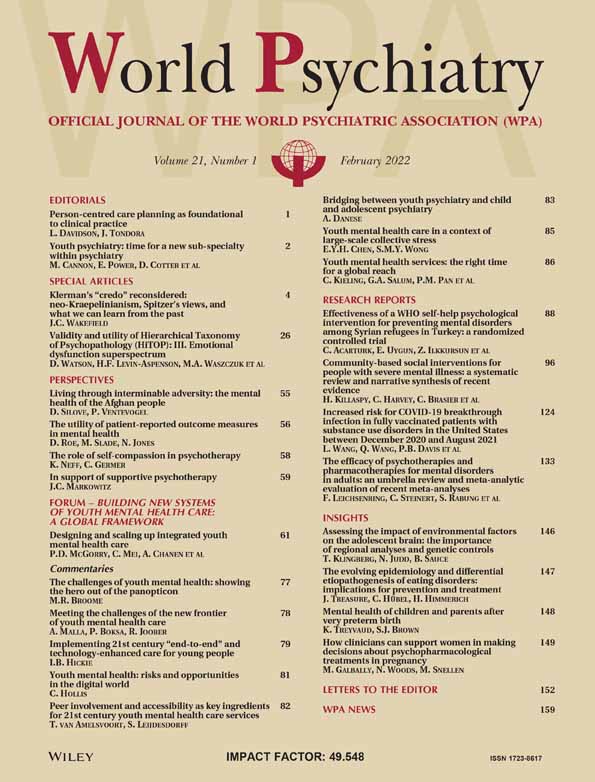氯氮平与特定剂量其他抗精神病药物在精神分裂症中的有效性:一项来自两个全国性队列的荟萃分析。
IF 73.3
1区 医学
Q1 Medicine
引用次数: 0
摘要
虽然氯氮平是治疗难治性精神分裂症最有效的药物,但超过一半的患者对这种疾病的反应不足。关于氯氮平有效增强策略的指导有限。我们研究了特定剂量口服奥氮平、喹硫平、利培酮和阿立哌唑增加氯氮平治疗对精神分裂症或分裂情感性障碍患者因精神病发作住院风险的比较效果,作为严重复发的标志。在这项基于人群的研究中,从芬兰(1995-2017年,N= 14053)和瑞典(2006-2021年,N= 8743)全国登记的患者中确定了其中一种诊断接受氯氮平治疗的患者。通过个体内设计评估与氯氮平增强抗精神病药物治疗与同剂量氯氮平单药治疗相关的精神病发作住院风险,使用每个个体作为他/她自己的对照以消除选择偏差,并使用分层Cox模型进行分析。首先分别对两个国家的队列进行分析;然后使用随机效应荟萃分析将结果结合起来。次要结局是躯体住院,以及因精神病或躯体原因住院。在这两个国家中,唯一与显著降低精神病住院风险相关的增加是中剂量(9至<16.5 mg/天)阿立哌唑联合高剂量(≥330 mg/天)氯氮平,在meta分析中,这种联合与最佳结果相关(校正风险比,aHR=0.68, 95% CI: 0.62-0.75, p<0.0001)。在使用中剂量(180 ~ <330 mg/天)氯氮平的患者中,中剂量阿立哌唑强化治疗是Bonferroni矫正后唯一比氯氮平单药治疗更有效的治疗方法(aHR=0.79, 95% CI: 0.70 ~ 0.91, p=0.0006)。使用所有高剂量的增强药物都与因精神病住院的风险增加有关。只有阿立哌唑增加剂量与因精神病或躯体原因住院的风险降低相关,中剂量阿立哌唑加高剂量氯氮平的风险最低(aHR=0.70, 95% CI: 0.58-0.84, p=0.0001)。这项荟萃分析涉及两个全国性队列,总计23000名使用氯氮平的患者,结果表明,与氯氮平单药治疗相比,中剂量阿立哌唑增强氯氮平治疗与严重复发风险降低20-30%相关,而高剂量阿立哌唑增强(以及高剂量所有其他抗精神病药物)与复发风险增加相关。本文章由计算机程序翻译,如有差异,请以英文原文为准。
Effectiveness of clozapine augmentation with specific doses of other antipsychotics in schizophrenia: a meta-analysis from two nationwide cohorts.
Although clozapine is the most effective medication for treatment-resistant schizophrenia, response is inadequate in over half of people with that condition. There is limited guidance available on effective clozapine augmentation strategies. We studied the comparative effectiveness of specific doses of oral olanzapine, quetiapine, risperidone and aripiprazole augmentation of clozapine treatment on the risk of hospitalization due to a psychotic episode, as a marker for severe relapse, among patients with schizophrenia or schizoaffective disorder. In this population-based study, patients with one of those diagnoses receiving clozapine were identified from Finnish (years 1995-2017, N=14,053) and Swedish (years 2006-2021, N=8,743) nationwide registers. The risk of hospitalization due to a psychotic episode associated with periods of antipsychotic augmentation of clozapine treatment vs. same-dose clozapine monotherapy was assessed by a within-individual design, using each individual as his/her own control to eliminate selection bias, and analyzed with stratified Cox models. The two national cohorts were first analyzed separately; then results were combined using a random-effect meta-analysis. Secondary outcomes were somatic hospitalization, and hospitalization for psychosis or a somatic cause. The only augmentation associated with a significantly decreased risk of hospitalization due to psychosis in both countries was medium-dose (9 to <16.5 mg/day) aripiprazole combined with high-dose (≥330 mg/day) clozapine, and this combination was associated with the best outcome in the meta-analysis (adjusted hazard ratio, aHR=0.68, 95% CI: 0.62-0.75, p<0.0001). Among patients using medium-dose (180 to <330 mg/day) clozapine, medium-dose aripiprazole augmentation was the only treatment more effective than clozapine monotherapy after Bonferroni correction (aHR=0.79, 95% CI: 0.70-0.91, p=0.0006). The use of all high-dose augmentations was associated with an increased risk of hospitalization due to psychosis. Only aripiprazole augmentations were associated with a decreased risk of hospitalization for psychosis or a somatic cause, and the lowest risk was observed for medium-dose aripiprazole plus high-dose clozapine (aHR=0.70, 95% CI: 0.58-0.84, p=0.0001). This meta-analysis of two nationwide cohorts, totaling almost 23,000 patients using clozapine, indicates that medium-dose aripiprazole augmentation of clozapine treatment is associated with a 20-30% decreased risk of severe relapse compared with clozapine monotherapy within the same individuals, while augmentation with higher doses of aripiprazole (as well as with high doses of all other antipsychotics) is associated with an increased relapse risk.
求助全文
通过发布文献求助,成功后即可免费获取论文全文。
去求助
来源期刊

World Psychiatry
Nursing-Psychiatric Mental Health
CiteScore
64.10
自引率
7.40%
发文量
124
期刊介绍:
World Psychiatry is the official journal of the World Psychiatric Association. It aims to disseminate information on significant clinical, service, and research developments in the mental health field.
World Psychiatry is published three times per year and is sent free of charge to psychiatrists.The recipient psychiatrists' names and addresses are provided by WPA member societies and sections.The language used in the journal is designed to be understandable by the majority of mental health professionals worldwide.
 求助内容:
求助内容: 应助结果提醒方式:
应助结果提醒方式:


